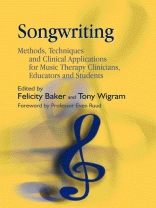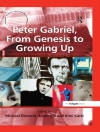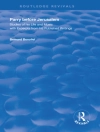This comprehensive and groundbreaking book describes the effective use of songwriting in music therapy with a variety of client populations, from children with cancer and adolescents in secondary school to people with traumatic brain injury and mental health problems.
The authors explain the specific considerations to bear in mind when working with particular client groups to achieve the best clinical outcomes. All the contributors are experienced music therapy clinicians and researchers. They provide many case examples from clinical practice to illustrate the therapeutic methods being used, together with notated examples of songs produced in therapy. Particular emphasis is placed on how lyrics and music are created, including the theoretical approaches underpinning this process.
This practical book will prove indispensable to students, clinical therapists, music therapists, educators, teachers and musicians.
Daftar Isi
Foreword, Even Ruud. Introduction: Songwriting as therapy, Felicity Baker, The University of Queensland, Australia and Tony Wigram, Aalborg University, Denmark. 1. Improvised Songs and Stories in Music Therapy Diagnostic Assessments at a Unit for Child and Family Psychiatry: A Music Therapist’s and a Psychotherapist’s Perspective, Amelia Oldfield, The Croft Children’s Unit, Cambridge, UK and Christine Franke, Centre for Psychoanalytic Studies, Essex University, UK. 2. You Ask Me Why I’m Singing: Song creating with Children and Parents in Child and Family Psychiatry, Emma Davies, The Croft Children’s Unit, Cambridge, UK. 3. Teenagers and songwriting: Supporting in a Mainstream Secondary School, Philippa Derrington, Cambridgeshire Instrumental Music Agency, UK. 4. Giving a Voice to Childhood Trauma through Therapeutic Songwriting, Toni Day, The University of Queensland, Australia. 5. Collaborations on Songwriting with Clients with Mental Health Problems, Randi Rolvsjord, Sogn og Fjordane University College, Norway. 6. Songwriting to Explore Identity Change and Sense of Self-concept Following Traumatic Brain Injury, Felicity Baker, Jeanette Kennelly, The Royal Children’s Hospital, Australia and Jeanette Tamplin, Royal Talbot Rehabilitation Centre, Australia. 7. Working with Impairments in Pragmatics through Songwriting with Traumatically Brain Injured People, Felicity Baker. 8. Assisting Children with Malignant Blood Disease – and Their Family – to Create and Perform Their Own Songs, Trygve Aasgaard, Norwegian Academy of Music and Oslo University College, Norway. 9. Songwriting with Adult Patients in Oncology and Clinical Haematology, Emma O’Brien, The Royal Melbourne Hospital, Australia. 10. The Music Therapist as Singer/Songwriter: Applications with Bereaved Teenagers, Robert Krout, Southern Methodist University, Texas, USA. 11. Songwriting with Oncology and Hospice Adult Patients from a Multicultural Perspective, Cheryl Dileo, Temple University, Philadelphia, USA and Lucanne Magill, Memorial Sloan-Kettering Cancer Center, New York, USA. 12. Songwriting Methods – Similarities and Differences: Developing a Working Model, Tony Wigram. References. Index.
Tentang Penulis
Amelia Oldfield is a well-known and prestigious music therapist with over 25 years’ experience in the field. She works at the Croft Unit for Child and Family Psychiatry and at the Child Development Centre, Addenbrookes. She also lectures at Anglia Polytechnic University, where she co-initiated the MA Music Therapy Training. Amelia has completed four research investigations and a Ph D. She has also produced six music therapy training videos. She is married with four children and plays clarinet in local chamber music groups in Cambridge, UK.












